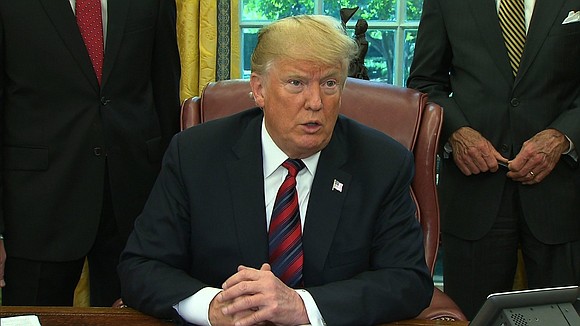Trump wants to change how Medicare pays for certain drugs
CNN/Stylemagazine.com Newswire | 10/25/2018, 1:55 p.m.
By Tami Luhby and Lauren Fox, CNN
(CNN) -- President Donald Trump will outline a plan Thursday to revamp how Medicare pays for certain pricey drugs -- a step that comes as Republicans seek to bolster their standing with voters on health care in the days before the midterm elections.
Health and Human Services Secretary Alex Azar, who's set to appear alongside Trump, tweeted early Thursday morning about how much the government pays under Medicare Part B for drugs administered in doctor's offices and hospital outpatient centers. They are used to treat conditions such as cancer and autoimmune disorders, which come with super-high price tags.
"I look forward to hearing from @POTUS later today on the administration's efforts to address the high cost of prescription drugs, and our work to put American patients first," Azar also tweeted.
The administration wants to test negotiating the price of these drugs based on their cost in certain other countries, according to Politico. Azar released a report on Thursday morning that found pharmaceutical manufacturers charge 1.8 times more for Part B drugs in the US compared to other nations.
Officials are also seeking to change how doctors are reimbursed for administering the drugs, reducing their incentives to select high-priced options, according to Politico. It could pay them a flat fee, instead of the current system of providing a percentage of the medication's cost.
The President's message on drug prices so close to the midterms illustrates the complicated relationship the party has with health care at the moment. On the one hand, Trump continues to tweet about how his administration and party have fought to help people with pre-existing conditions and how he will hold those in his party accountable if the seek to roll back those protections.
But, the administration has in fact been supportive or actively engaged in efforts that could affect people with pre-existing conditions -- from repeated attempts to roll back Obamacare to efforts at the agency level to loosen regulations that provide ironclad protections for consumers who are or have been sick.
Also, Trump's Justice Department is seeking to invalidate the health reform law's provisions governing pre-existing conditions as part of lawsuit being brought by 20 Republican states.
After nearly a decade of promises to repeal and replace the Affordable Care Act, Republicans have struggled to message health care on the campaign trail. Democrats have attacked the party for gutting protections for people with pre-existing conditions. In fact, Democrats -- after years of being on defense on Obamacare-- made healthcare a centerpiece of their midterm campaign strategy.
With less than two weeks to go until Election Day, many Republicans now don't talk about repealing Obamacare. They talk about bringing down costs.
High drug prices have also been a source of anxiety for many Americans. But basing Medicare reimbursement on what other countries pay would be a huge departure from how the program currently works and run counter to Republicans' allegiance to the free market system.
The proposal is likely to run into major resistance from drug companies, as well as doctors, hospitals and some patient advocacy groups. Such blowback has doomed prior administrations' attempts to control Medicare payments.
Also, the federal government doesn't have a lot of negotiating power when it comes to Part B drugs because Medicare cannot exclude medications. Previous administrations have resisted the idea of restricting Americans' access to drugs or treatments, which is more common in other countries' national health care systems.
While Trump officials could use an Obamacare-created innovation center to pilot new payment proposals, it would have to take a hard stance on prices.
"We don't negotiate because we don't use the threat of walking away and other countries do," said Rachel Sachs, an associate professor of law at Washington University.
Trump, however, has also long promised to bring down the cost of prescription drugs. His administration released a 44-page blueprint in May that laid out his vision for increasing competition and changing the incentives for the industry. Trump at the time also blasted foreign governments that "extort unreasonably low prices" from manufacturers, saying "it's unfair and it's ridiculous, and it's not going to happen any longer."
Earlier this month, he signed bills ending the so-called gag-order on pharmacists, which prevent them from discussing cheaper options with customers. And Azar also announced a proposal requiring manufacturers to include the list price of any drug paid for by Medicare or Medicaid in television ads.
The administration has also unveiled several plans seeking to curb the cost of Part B drugs, which can be among the highest-priced medicines, in recent months.
Overall, however, many industry experts say that most of the efforts merely tinker around the edges of the nation's problem of high-cost drugs. They don't get at the root cause -- the prices that manufacturers charge.




